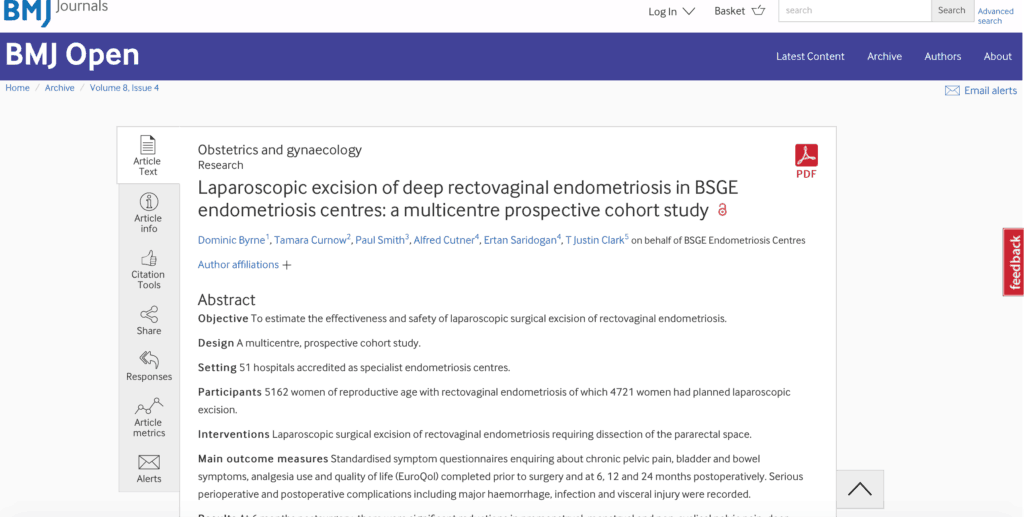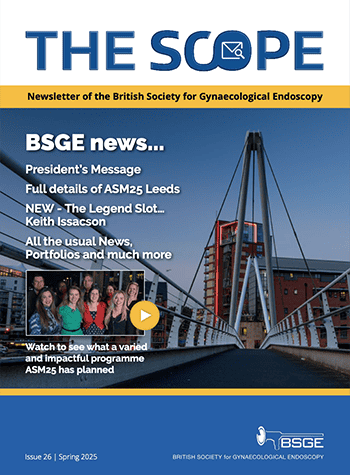LANDMARK ENDOMETRIOSIS CENTRE COHORT STUDY PUBLISHED ON BMJ OPEN
The BSGE Endometriosis Centres Scientific Advisory Group has just published ground-breaking research in BMJ Open. Laparoscopic excision of deep rectovaginal endometriosis in BSGE endometriosis centres: a multicentre prospective cohort study, is the largest study of its kind in the world. Using data from the BSGE’s network of Endometriosis Centres, the study looked at nearly 5000 patients who had surgery for severe endometriosis, performed by more than 100 different surgeons in 51 different hospitals.
Launching the paper, BSGE President Dominic Byrne said
“The BSGE has worked for over a decade to establish and accredit a network of specialist Endometriosis Centres, so patients with severe endometriosis can have access to specialist laparoscopic surgery. This paper is the culmination of this enormous effort and reports the outcome of nearly 5,000 patients. It is a landmark moment.”
The study looked at women with deep and complex endometriosis. Women treated in a BSGE Endocentre who underwent laparoscopic excision of deep rectovaginal endometriosis, which required dissection of the pararectal space and gave written consent for data collection,
were included in the study. The results showed that six months after the surgery the women experienced significant reductions in premenstrual, menstrual and non-cyclical pelvic pain, deep dyspareunia, dyschezia, low back pain and bladder pain. In addition, there were significant reductions in bowel frequency, urgency, incomplete emptying, constipation and passing blood. These reductions were maintained at 2 years. There were also improvements in quality of life scores and decreased use of analgesia, with opiate usage falling from 28.1% prior to surgery to 16.1% at 6 months. Dominic summarised:
“This is largest paper ever published on laparoscopic surgery for severe endometriosis and patients confirmed that their symptoms, and quality of life, improved after surgery and these improvements were sustained at two years”
The study highlights the importance of surgery in specialist centres and the Endocentre project. Half of the women studied had undergone previous surgery for endometriosis, mostly in non-specialist centres, and were still symptomatic. As BSGE members will be very aware, surgical management of deep endometriosis is technically challenging and can be associated with serious complications. However, the study reported reassuringly low rates of major complications. The overall incidence of complications was 6.8%, with gastrointestinal complications in 1.1% of procedures and ureteric/ bladder injury or leak in 1% of operations. Justin Clark, Chair of the Research and Audit portfolio and lead researcher on the project said:
“This paper demonstrates the success of the BSGE Endometriosis Centre project. By training surgeons and accrediting specialist endometriosis surgical centres, the BSGE aimed to improve access and clinical outcomes for women with severe pain from extensive endometriosis. By mandating prospective outcome data collection from all accredited centres the BSGE has been able to produce this series of nearly 5000 women, by far the largest in the world. The results support the safety and effectiveness of laparoscopic surgery when conducted in specialist BSGE endometrial centres. This information will help inform women about their treatment decisions for this disabling condition.”
The BSGE has grown and developed to become an in uential specialist society, of which members can be proud. Justin highlighted this evolution:
“The BSGE has come of age. No longer simply a society for ‘boys with toys’ but a specialist society committed to harnessing technological advances, training surgeons, setting up networks of quality assured specialist BSGE Endometriosis Centres and importantly publishing outcome data to improve the clinical outcomes of the women we look after’. Dominic also highlighted
the achievement, as he comes to the end of his tenure as BSGE President saying ‘The paper represents 8 years of hard work to get endometriosis centres properly set up and working to produce quality data. To accomplish this enormous dataset from our Endocentres is a tremendous achievement.”

The paper can be read online, or downloaded at BMJ Open




